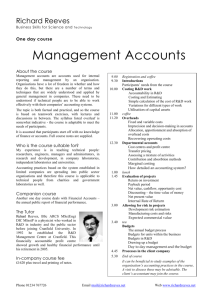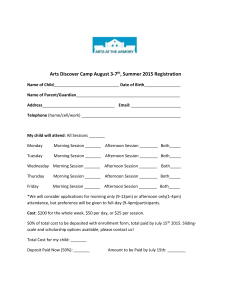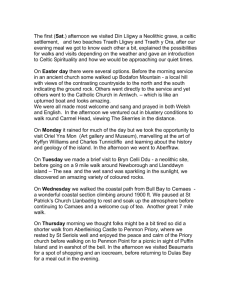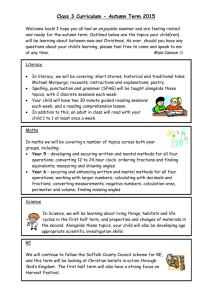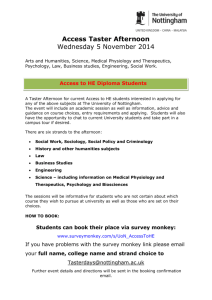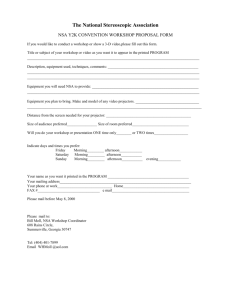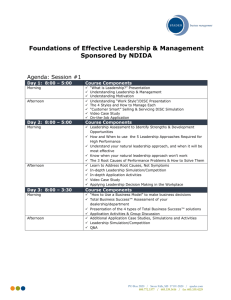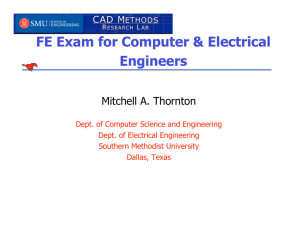course leaflet - Website of Richard Reeves
advertisement
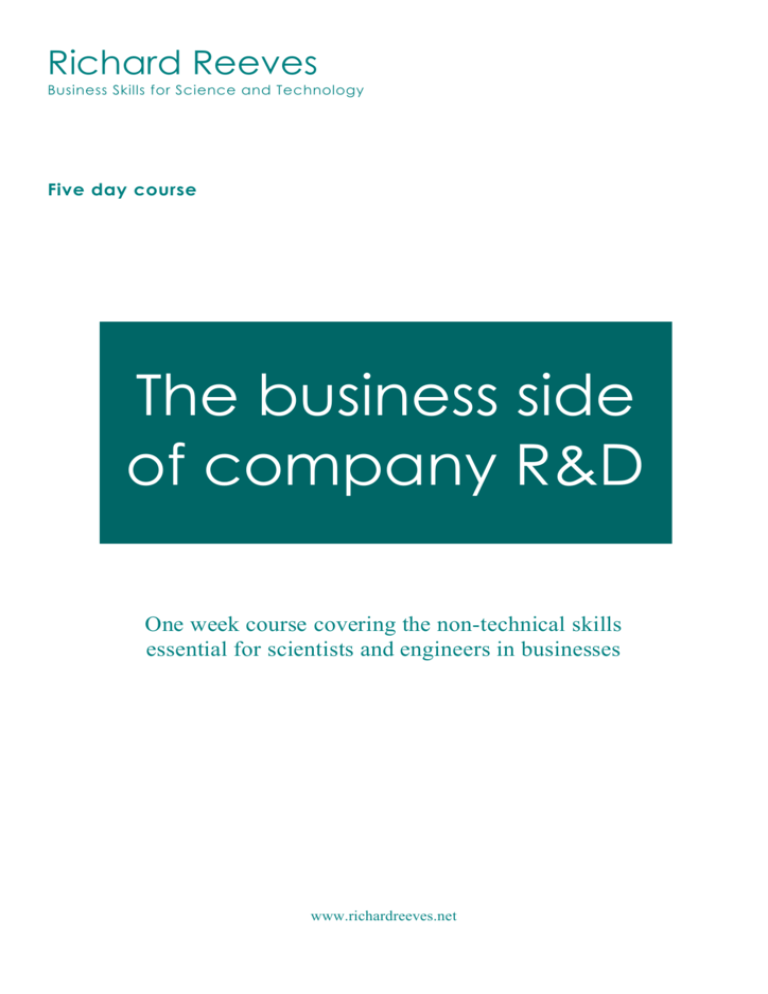
Richard Reeves Business Skills for Science and Technology Five day course The business side of company R&D One week course covering the non-technical skills essential for scientists and engineers in businesses www.richardreeves.net The business side of company R&D The tutors The Course This course offers a broad introduction to the nontechnical knowledge and skills needed for the successful practice of industrial R&D. The commercial laboratory can offer a highly fulfilling environment for the scientist or engineer, but the chances of making a valuable contribution are greatly improved by understanding the context and requirements of R&D in a company, and its links with the concerns of corporate management. The course is based on our knowledge of training needs gained from talking to hundreds of industrial managers on our courses. It draws together up to date thinking from across our entire courses range. Comment from a successful small company Prof Simon Saunders, Chief Technology Officer, Cellular Design Services I think you have all the necessary material distributed across your courses and a one-week intensive compilation would be a great start to a career in R&D management. Those in the early stages of their career will benefit from understanding the process of commercial R&D as well as their technical speciality. Comment from a large company Raglan Tribe. Mindsheet. Former technical director, De La Rue When I first went into R&D I had no concept of management. I wanted to invent things. It was a big shock when I started working and found that actually doing R&D was only a small part of the day. There are a lot of staff in R&D who do not fully understand how their contribution fits in. A course is needed to understand the context – the bits you are not working on. Four roles can be identified in R&D – bench scientist, project manager, functional manager, R&D manager/strategist. Normally very few people have any training in the non-technical aspects of their work, and those in all four roles would gain from this course. WHO THE COURSE IS FOR Scientists and engineers working in commercial R&D Maximum number of participants - 12 Richard Reeves PhD. Former director of the R&D Management Centre at Cranfield. A physicist with experience in R&D at the NPL, British Gas, and the Plessey Company. At Cranfield he ran 250 commercial short courses in R&D. Matthew Last BA Hons, MBA, DipM is MD of Magela Consultants Ltd, who specialise in helping technical people acquire business skills. He has extensive business development experience with R&D organisations and has been a Director of a precision engineering company, a landfill company and an Internet portal company. www.magelaconsultants.co.uk Bill Metcalf MA BSc FInstP CPhys CEng FIEE served a formal apprenticeship, worked in the Cavendish Laboratory, HewlettPackard and the Philips Group, and was for 10 years the CEO of an electronics company. He now runs his own project management consultancy. In his spare time he has set up Eastern Europe’s largest digital map production company. www.geo-strategies.com Leslie Falkingham PhD, Recently Technology Director ALSTOM T&D Medium Voltage Business, and now MD of his own company, Vacuum Interrupters Ltd. Winner of two gold medals for outstanding technical innovation in electronic engineering, Leslie also has 25 years of practical R&D management in a high technology field. Leslie studied R&D management for his PhD. About this course, he says: “People have a lack of overall knowledge about R&D. They move into it without training. They need a theoretical framework for what they are doing, hints and tips and day to day wrinkles, and attention to their own particular short term problems. A week covering the current state of knowledge about R&D management would have been very worthwhile for me when I first entered R&D. Now with the number of levels of management reducing, people are more involved, and such a course is needed even more.” www.richardreeves.net The business side of company R&D Monday Tuesday Wednesday Thursday Friday Morning Morning Morning Morning Morning Strategic level R&D Costing projects Finance Project Management The R&D unit Registration 9.3010.00 Introductions Delegates’ roles and needs from the course The nature of the R&D function Scope for major success or failure First, second and third generation R&D Company/R&D relationships A language for managing R&D StageGate systems Success rates in new product development Procedures for managing risk Delegates cases Presentation and discussion of problems and successes from participants’ own experiences Financial accounts Profit and loss statement Balance sheet Debtors and creditors Cash flow statement R&D in accounts How companies fund R&D Organisational models in use Justifying R&D to the company Weaknesses of financial methods The option approach Boardroom concerns Shareholders Sources of capital Competing demands for company funds The project management cycle Project dynamics Project teams Team roles Balanced teams Project planning Defining objectives Dividing work into parts Work breakdown structures Network diagrams Gantt charts SMART milestones Managing projects Administrative structure Documentation Monitoring progress Phase reviews Corrective action Case: development of a new technology in a market Concerns of the R&D unit Hierarchy of strategic needs Strategy destroying events Seven principles for an R&D section Case: the ups and downs of an R&D department Communicating R&D to the company Comparison with competitors Projecting professionalism Identifying company expectations Afternoon Afternoon Afternoon Afternoon Afternoon Technology markets Evaluating projects Intellectual Property Managing projects People in R&D Product lifecycles How technologies and products develop Tasks of R&D and marketing in the lifecycle phases Portfolio selection Selecting projects to invest company money in Marketing The strategic role of marketing The Marketing and R&D relationship Why organisations 'buy' R&D The overall marketing package Marketing planning and life cycles Case study Evaluating projects Payback, return on investment The time value of money Discounted cash flow Internal rate of return Allowing for risk in projects Types of risk Calculation of Expected Commercial Value model Budgets The budget setting process Working to a budget Monthly budget statements Types of IP Patents, copyright, design rights, trade marks, know how Patenting procedure Costs and timescales Ownership of IP Employees and employers Contractors and freelances Application of IP Enforcement of rights Licensing Managing IP Finding and using patent information Using a patent agent Responsibilities of the IP manager Team leadership Project leadership Followership Styles for phases of the project Influencing skills Securing the project’s needs Project management exercise Project tools Software Practices in a typical large company Balancing budget, portfolio, StageGate and project management reports Discussion of systems in use in participant’s companies The role of individuals success factors in new technology Characteristics of achieving individuals Career aims in R&D Motivation and demotivation Personality types and teamwork Stochasts and Cartesians Case study Adventures of a scientist Debrief and final discussion Skittles in the pub Preparation Free evening Course dinner Costing R&D work Costing, estimating and pricing Different types of R&D work Calculating rates for R&D work Overheads Fixed and variable costs Cost centres and profit centres Allocation, apportionment and absorption of costs 4.30 End of course Course delivered at client’s premises. Price £7,500 plus printing of notes, travel and accommodation costs. mail@richardreeves.net (44) 01234 767726
